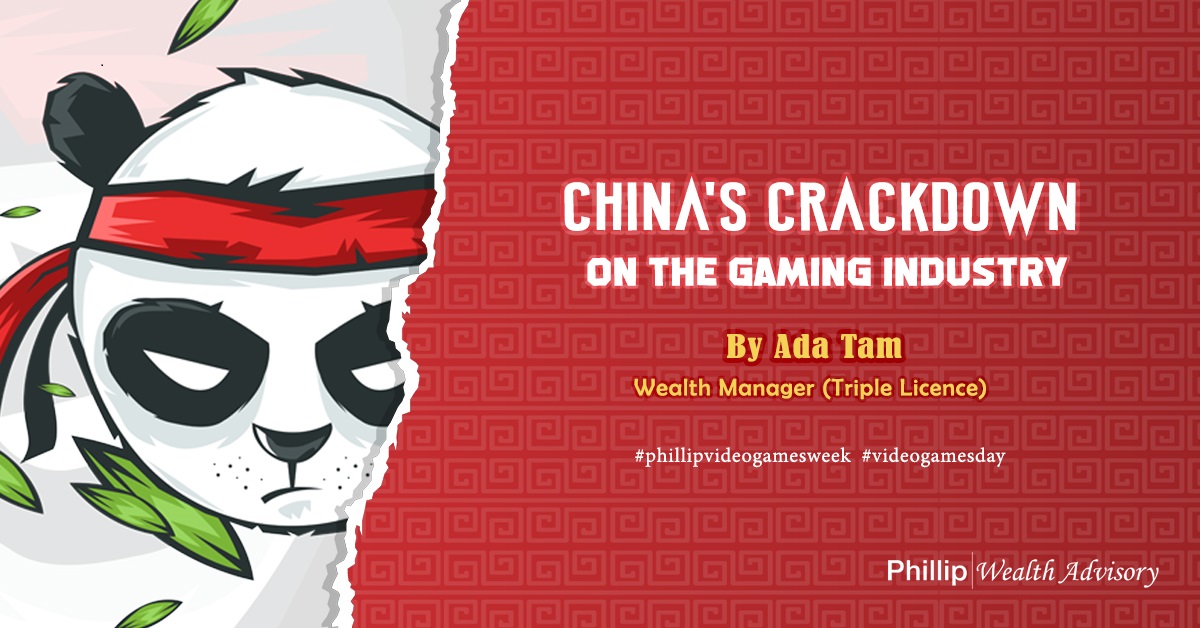China’s Crackdown on the Gaming Industry September 7, 2021

What this report is about:
- Understanding China’s economic evolutions of online gaming industry for the past 50 years.
- Analysing the motives behind the China’s crackdown on gaming companies.
- What are the strategies that companies use to counteract with China’s regulations?
With the US National Video Games Day just around the corner, on 12 September 2021, do investors realise that the revenue generated by the video game industry each year amounts to billions of dollars? That’s something that cannot be ignored! In fact, COVID-19 lockdowns have boosted the popularity of video games and eSports, spurring the usage of apps and video games all across the world.p>
China has overtaken the US as the largest video gaming market in the world [1][2]. In 2020, the number of gamers in China reached more than 665mn. This was 110 times the population of Singapore. The number of gamers started to slow down after peaking in 2011, but an increase in female gamers, eSports and cloud gaming has revived the sector ever since.[3][4].
Evolution of China’s Online Gaming Industry
China began to reform its economy and open it up to foreign investments in 1978. At that time, only selected foreign goods were allowed into China.
Video game consoles were first introduced to China in the 1990s. Back then, most gamers still headed to arcades to access their games, as video game consoles were considered too luxurious and pricey for the average household to own. Within a few years, though, the video-gaming industry grew by leaps and bounds, as China’s economic opening lifted many people out of poverty and made many foreign goods more affordable.
With exponential growth in video gaming came piracy issues. Regulators started to notice software piracy in the gaming industry in the 1980’s. In 2000, the Ministry of Culture ruled that playing video games would harm young people, threaten national security and disturb China’s social order. [5] In 2000, an outright ban was slapped on foreign consoles, preventing millions of consoles from industry giants such as Sega, Sony and Nintendo from reaching China. This immediately decimated the sale of all foreign consoles overnight. However, gaming did not grind to a complete halt as the Ministry allowed computer gaming to continue. Chinese companies responded by mass-producing games for the local market. This was the time when companies like Tencent, NetEase and many other domestic newcomers flourished.
Still, although computer gaming was heavily sought after by gamers, not many were able to afford a PC at home. This led to the rise of Internet cafés as gaming destinations, providing the young with cheap and easy access to the latest gaming software.
By 2012, rumours were swirling that China would change its policy on gaming. Indeed, the ban was eventually lifted in 2015. Massive growth in the gaming market followed right after, with Microsoft’s Xbox One being the first to be launched after the ban was lifted.
In 2014, Sony announced plans to deliver more online games. It engaged 70 third-party game makers to widen its product range. Such collaboration created opportunities for local start-ups to join the gaming industry. Games such as King of Wushu (by Suzhou Snail Digital Technology Co., Ltd), Mr. Pumpkin Adventure (by Shanghai Youju Information Technology Co., Ltd), and One Tap Hero (by Shanghai Kena Information Technology Co., Ltd) were soon developed.
Today, one of the most successful game makers, Tencent, is a multi-national company with the largest market share of online gaming in the world. Tencent also owns TiMi Studios, the maker of popular video games Honor of Kings and Call of Duty Mobile, which generated revenue of US$10bn [7] last year.
Companies like Sony, Microsoft and Nintendo continued their push into China. Keeping a watchful eye on the impact on social conduct, Beijing reinforced its compliance requirements. Since then, all new releases of gaming software had to be approved by its censorship department. They must satisfy the regulators that their content was appropriate and in line with the core values of the nation. Foreign console makers faced an additional challenge in their attempts to penetrate the Chinese market, which was price-setting. According to a report by CLSA, “More than 70 percent of Chinese gamers earned less than 4,000 yuan (US$634) a month.” A brand-new high-end Xbox One or Sony PlayStation 4 was selling for nearly US$500 and US$400 respectively in the US. Not only that, each new game for each console cost about US$60.
Given these price hurdles, many companies decided to wait and see before going all out to market their consoles. Rampant software piracy and intellectual-property thefts in China also held back the foreign investors. The truth was, many local gamers still preferred illegal online games and pirated software which were cheaper.
In 2018, the government decided to reform its censorship department. This resulted in delays in granting approving to gaming companies for their new launches.
In April 2019, China finally gave the nod to eSports by officially recognising job titles such as eSports operators and eSports professionals. All eSports professionals were categorised into one of five levels according to their performances and achievements, from level 5 which was the lowest to level 1, the highest. At the same time, it announced that China would be transforming into a manufacturing powerhouse, by accelerating the development of high-tech industries such as artificial intelligence, the Internet of Things, big data and cloud computing.
While promoting nationwide digitalisation, the regulators also emphasised the importance of upholding corporate social responsibility by companies. With the rise of video gaming addiction among the country’s teens and children, measures such as restricting gaming play time was considered as essential to reinstating the social order.
Understanding China Today.
Despite the recent regulatory risks faced by Chinese tech companies, China remains a prime market for foreign gaming companies. With the world’s biggest Internet population of 946.4mn [8a] and the highest revenue of US$40.8bn [8b] in the gaming industry, China is still a market that cannot be overlooked by the West.
But to know where to place bets, investors must understand China’s political values and its cultural differences with the West.
With almost half of its population participating in online gaming, domestic gaming revenue reached RMB278.7bn or US$43bn [US$40.8bn above?] [9] in 2020. Early last month, a state-media article described online gaming as ‘spiritual opium’, referring to video-game addiction among minors. Such remarks immediately triggered a sell-off of nearly US$100bn worth of stocks, wiping off the value of almost all gaming stocks overnight. Tencent alone lost as much as US$43bn in market value in August 2021, after the criticism was published. [10].
You might ask, would any country kill the goose that lays its golden eggs? The answer is, China probably will. For all its economic breakthroughs, China is still not a democracy. The idea of common ownership of all means of production and an absence of social classes remains deeply etched in its psyche. China most recently incorporated ‘common prosperity’ in its 14th Five-Year Plan. This aims to ensure more even and fairer sharing of wealth.
This is the background against which China issued its new ruling on 31 August 2021. To address gaming addiction among its young, rules previously restricted play time to no more than 90 minutes a day and three hours on holidays. Under the new rule, gaming time for players under 18 years old is further limited to three hours a week. Minors are only allowed to game between 8pm and 9pm on Fridays, Saturdays, Sundays and statutory holidays, as the government believes that prolonged gaming would affect their learning ability as well as physical and mental health. To enforce implementation, gaming companies have been instructed to incorporate real-name registration for user login. Those without registration will not be granted access to games.
Man seasoned gamers doubt that the new regulation would be effective, arguing that children can continue to access their games with their parent’s login IDs.
Many tech companies like Tencent, though, have expressed their support for the new ruling. Tencent has agreed to make the adjustments as soon as possible. It also highlighted that players under 16 only contributed 2.6% to its current gross revenue in China.
The New Era
Keeping in mind that restrictions on the lucrative gaming industry in China are inevitable, for both political and cultural reasons, what should investors do then?
As their online rallies continue on Reddit and Twitter, more and more retail investors across the globe would want a share of the pie. This has snowballing effects on sentiment, with the next investors blindly plonking down their funds as they await the next price surge. In this way, the share prices keep spiralling.
1. Diversification
Online gaming companies are likely to build competitive edges to diversify their business worldwide. Creating new products for new markets is no longer a choice but a necessity for many of them. The ability to generate various sources of revenue would help these companies manage their risks better and reduce earnings volatility from overreliance on the domestic market.
Tencent, for example, has been expanding aggressively outside China. TiMi Studio Group, its flagship game developer, recently launched a gaming studio in Montreal, Canada and acquired two new firms in a bid to take on Microsoft and Sony. Tencent also took a majority stake in Swedish gaming company Stunlock Studios, bringing its total developer workforce to more than 4,000. [11] Its aim is to derive half its gaming revenue from overseas eventually.
2. Virtual Reality (VR)
Virtual reality refers to the use of computer technology to simulate 3-D images or environments that users can interact with in a seemingly real or physical way using special electronic equipment. Such equipment includes helmets with screens or gloves fitted with sensors. Unlike traditional user interfaces, VR enables users to be placed “inside” a simulated world, potentially giving a greater sense of immersion than a traditional flat screen.
According to Goldman Sachs [12], VR and augmented reality technologies will be worth more than US$80bn by 2025. This implies that the adoption of virtual technologies is in demand and will continue to grow for the next decade.
3. Chip and hardware makers:
Investors can also diversify their portfolios from software companies to include some hardware companies. Given a global shortage of chips early this year, which has directly affected the production of various high growth sectors like Electric Vehicles, Consumer Electronics, LEDs and solar panels, a massive shipment delays have already impacted the supply chain to their customers. As such, many chip companies are sought after by investors.
4. Foreign Game Makers.
By now, many Chinese companies would have realised the value of creating partnerships or entering into operating agreements with their foreign counterparts. This means that investors can consider including one or two US gaming companies which are collaborating with businesses in China:
- Blizzard Entertainment’s World of Warcraft is operated by NetEase.
- Nintendo distributes its games through Tencent.
- Player Unknown’s Battlegrounds, developed by Korean company PUBG Corporation, is distributed by Tencent. In 2019, Tencent modified the name of the game to Game for Peace as Chinese regulations called for a removal of games that contained too much violence.
The Future of Gaming
Artificial intelligence refers to computers and machines equipped with “cognitive” functions to imitate humans, with capabilities of the human mind like learning and problem-solving. Today, AI is extensively used in e-commerce and healthcare to enhance the customer experience.
To cater to the tech-savvy generations, gaming companies will increase the use of AI in their hardware to maximise the gaming experience for a bigger market share. Companies like Tencent, NetEase and Changyou have already adopted speech-recognition systems for gamers to interact with using hands-free devices.
The online gaming industry is no longer just an entertainment business. With an unexpected surge in the number of Internet users during COVID lockdowns, many Internet industries are burgeoning. Exponential advances in technologies are likely to change the world faster than many of us can imagine.
Reference:
- [1]https://www.weforum.org/agenda/2021/08/which-countries-have-the-largest-video-gaming-markets/
- [2]https://www.statista.com/statistics/308454/gaming-revenue-countries/
- [3]https://www.forbes.com/sites/tomokoyokoi/2021/03/04/female-gamers-are-on-the-rise-can-the-gaming-industry-catch-up/?sh=14dc1752f9fe
- [4]https://www.forbes.com/sites/forbescommunicationscouncil/2021/01/27/the-meteoric-rise-of-cloud-gaming-and-what-it-means-for-businesses/?sh=6ee1a9d74514
- [5]https://fortune.com/2021/09/03/china-video-gaming-mobile-smartphone-addiction-free-to-play/
- [6]https://sea.ign.com/tech-2/93160/news/china-to-earn-an-estimated-22-billion-in-2015-video-game-revenue
- [7]https://www.reuters.com/article/us-tencent-videogames-exclusive-idUSKBN2BP0FG
- [8a]https://newzoo.com/insights/rankings/top-10-countries-by-game-revenues/
- [8b]https://techjury.net/blog/gaming-industry-worth/#gref
- [9]http://www.news.cn/english/2021-09/02/c_1310164734.htm
- [10]https://www.scmp.com/tech/big-tech/article/3146437/chinas-video-game-industry-stormy-waters-country-grapples-its-love
- https://dabigcnews.org/2021/08/27/chinas-video-game-industry-is-in-trouble-due-to-its-love-hate-relationship-with/
- [11]https://press.stunlock.com/stunlock-studios-tencent/
- https://www.scmp.com/tech/tech-trends/article/3142097/tencent-launches-montreal-gaming-studio-acquires-two-new-firms-bid
- [12]https://www.goldmansachs.com/insights/pages/technology-driving-innovation-folder/virtual-and-augmented-reality/report.pdf, page 4
- https://www.goldmansachs.com/insights/pages/virtual-and-augmented-reality.html
Contributor:

Ada Tam
Wealth Manager (Triple Licence), Phillip Securities Pte Ltd
Email address: adatamyy@phillip.com.sg
Webpage: bit.ly/adatamyy
Disclaimer
These commentaries are intended for general circulation. It does not have regard to the specific investment objectives, financial situation and particular needs of any person who may receive this document. Accordingly, no warranty whatsoever is given and no liability whatsoever is accepted for any loss arising whether directly or indirectly as a result of any person acting based on this information. Opinions expressed in these commentaries are subject to change without notice. Investments are subject to investment risks including the possible loss of the principal amount invested. The value of the units and the income from them may fall as well as rise. Past performance figures as well as any projection or forecast used in these commentaries are not necessarily indicative of future or likely performance. Phillip Securities Pte Ltd (PSPL), its directors, connected persons or employees may from time to time have an interest in the financial instruments mentioned in these commentaries. Investors may wish to seek advice from a financial adviser before investing. In the event that investors choose not to seek advice from a financial adviser, they should consider whether the investment is suitable for them.
The information contained in these commentaries has been obtained from public sources which PSPL has no reason to believe are unreliable and any analysis, forecasts, projections, expectations and opinions (collectively the “Research”) contained in these commentaries are based on such information and are expressions of belief only. PSPL has not verified this information and no representation or warranty, express or implied, is made that such information or Research is accurate, complete or verified or should be relied upon as such. Any such information or Research contained in these commentaries are subject to change, and PSPL shall not have any responsibility to maintain the information or Research made available or to supply any corrections, updates or releases in connection therewith. In no event will PSPL be liable for any special, indirect, incidental or consequential damages which may be incurred from the use of the information or Research made available, even if it has been advised of the possibility of such damages. The companies and their employees mentioned in these commentaries cannot be held liable for any errors, inaccuracies and/or omissions howsoever caused. Any opinion or advice herein is made on a general basis and is subject to change without notice. The information provided in these commentaries may contain optimistic statements regarding future events or future financial performance of countries, markets or companies. You must make your own financial assessment of the relevance, accuracy and adequacy of the information provided in these commentaries.
Views and any strategies described in these commentaries may not be suitable for all investors. Opinions expressed herein may differ from the opinions expressed by other units of PSPL or its connected persons and associates. Any reference to or discussion of investment products or commodities in these commentaries is purely for illustrative purposes only and must not be construed as a recommendation, an offer or solicitation for the subscription, purchase or sale of the investment products or commodities mentioned.
About the author

Ada Tam
Wealth Manager (Triple Licence), Phillip Securities Pte Ltd
Ada is a wealth manager in Phillip Securities Pte Ltd. She holds a triple license in stockbroking, futures as well as financial advisory. Having worked in the financial industry for 16 years, she is dedicated to serving both retail customers and corporate clients, providing them with timely information and advice on decisions to build and manage investment portfolios. One of her roles is to conduct regular financial review sessions with clients to ensure all areas of clients’ financial needs are being taken care of. Last but not least, she is also involved with CFD and derivatives, to implement portfolio hedging strategies for clients when necessary. Ada has a bachelor’s degree in both Engineering (EEE) as well as Accounting & Finance. In addition, she has earned the title of CFD/ETD Specialist and Associate Financial Planner in her field of specialty.

 Grab Holdings Achieves First Full Year of Net Profit with Strong Revenue Growth
Grab Holdings Achieves First Full Year of Net Profit with Strong Revenue Growth  Lendlease Global Commercial REIT Strengthens Retail Portfolio with PLQ Mall Acquisition
Lendlease Global Commercial REIT Strengthens Retail Portfolio with PLQ Mall Acquisition  United Hampshire US REIT Delivers Strong Performance Amid Portfolio Stability
United Hampshire US REIT Delivers Strong Performance Amid Portfolio Stability  CDL Hospitality Trusts: Lease-Based Cash Flows Support Improving Leverage Profile
CDL Hospitality Trusts: Lease-Based Cash Flows Support Improving Leverage Profile 






